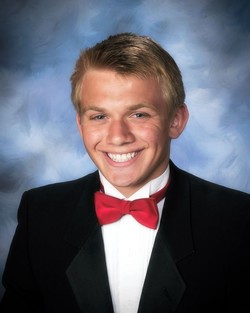Kerrick Woyshner, 18, was a scholar in the first college-level Anisfield-Wolf class, pioneered by Dr. Lisa Nielson at Case Western Reserve University. Students read essays, poems and books by Anisfield-Wolf Book Award winners, attended the September awards ceremony and did original research on topics inspired by the course.
“I never realized what motivated my hand to click on the ‘Reading Social Justice: The Anisfield-Wolf Book Awards’ class this summer,” Woyshner wrote. “I wanted something new. Though I hailed from a conservative, all-male Catholic high school, I plan on continuing this education my entire life, striving to benefit those who don’t have the resources so that I may one day become the Martin Luther King or, rather, the Kerrick Woyshner of social justice.”
A student from Hamburg in western New York, Woyshner decided to contrast the work of two Anisfield-Wolf Book Award winners: the Rev. Dr. Martin Luther King Jr., and Nobel Laureate Wole Soyinka.
By Kerrick Woyshner
The writings of Dr. Martin Luther King Jr. have left an indelible mark on humanity and its quest for racial equality. In them, King presents his campaign of nonviolent protesting that built the framework for the Montgomery Bus Boycott, the Birmingham Lunch Counter Sit-ins, and the March on Washington. King described these principles in his resounding first book, Stride Toward Freedom, which won the Anisfield-Wolf prize in 1959.
I argue that the life and writings of King, particularly in “Letter from Birmingham Jail”, serve as the United States’ most important references for effective and successful social change.
Born on January 15, 1929, in Atlanta, Georgia, King was the son and grandson of ministers who pioneered the struggle for African American equality. His grandfather, A.D. Williams, was one of the first heads of the Georgia chapter of the NAACP while his father, Martin Luther King, Sr. fought for equal salaries for African American teachers.
King skipped several grades and entered Morehouse College at 15 in search of “some intellectual basis for a social philosophy.” Torn between medicine, law, and the ministry, King chose the ministry. His study of social philosophers such as Plato, Aristotle, Rousseau, Locke, and Hegel, in addition to his theological studies, fed his ability to organize and speak eloquently to the subjugation of African Americans. The most important influence, however, on the collegiate King was India’s leading peace activist, Mohandas Gandhi. “The spirit of passive resistance came to me from the Bible and the teachings of Jesus,” King wrote, “…The techniques of execution came from Gandhi.”
Interestingly, as Gandhi was criticized by British officials for his Quit India speech, King was criticized by eight white, Birmingham clergymen in an open letter titled “A Call for Unity.” The eight called King’s coordinated marches and sit-ins “unwise and untimely,” which prompted King’s response: his famous “Letter from Birmingham Jail.” King demonstrated to his eight critics, the entire city of Birmingham, and the citizenry of the United States that his nonviolent movement for civil rights had never been more wisely and timely conducted, and he did it writing a letter upon scraps of wrinkled paper scavenged while locked up in Birmingham Jail.
King compared himself to Paul, one of Jesus’ apostles and one of Christianity’s predominant figures of the Apostolic Age, and to the early prophets of Christianity in bolstering his reasons for not sitting idly while the injustices of Birmingham were hindering the justice of humanity. “You deplore the demonstrations that are presently taking place in Birmingham,” King wrote to his critics, “But I am sorry that your statement did not express a similar concern for the conditions that brought the demonstrations into being.” King’s poignant response was persistent, powerful, and public.
Four months after King published his letter, he helped lead the March on Washington, making clear that his effort was not solely for the advancement of African American citizens, but for all races and religions that have endured the malicious sting of dehumanization globally.
Today, the Anisfield-Wolf Book Awards continue to recognize the Martin Luther Kings of society, the writers and orators who advocate for equality for all men and women regardless of their creed, color, disability or sexual orientation. The recipient of the 2013 Anisfield-Wolf Lifetime Achievement Award, Wole Soyinka, is a prime example. In his book The Man Died, Soyinka presents a stirring account of his time imprisoned in solitary confinement during the Biafran War in Nigeria.
In the same way that King recognized and exposed political and social injustice, Soyinka builds on King’s mission through moral obligation and immediate action, writing, “The man dies in all who keep silent in the face of tyranny.” Soyinka, whose literary and political gifts make him somewhat of a modern-day aggregate of Nelson Mandela and Martin Luther King, Jr., spoke in September of the need to preserve libraries, safeguard and extend education and bend toward the arc of justice that King outlined a half century ago.
King’s “I Have a Dream” message preached a solution to the contradictions and paradoxes in society’s deviation from the Declaration of Independence: the end of racism. By eliminating discrimination, the United States inches closer to its intended goal of granting life, liberty, and the pursuit of happiness to all of its citizens. This synthesis of equality and understanding, supported by work of Wole Soyinka and the other winners of the Anisfield-Wolf Book Awards, set King apart.
I believe in social justice in the same way King did. While I firmly believe those who do evil will be held to the principle of karma, it is not my place to perform such evil unto them. Similarly, King recognized that injustices cannot battle injustices — he had to kill his enemies with kindness. What’s more, King put his life on the line. He never knew when his last speech was going to be, when his last book was going to publish, what his last day would dawn, so he made each one count. He looked at wrongdoings and proposed peaceful, non-violent corrections. In this way, King viewed the world differently, so that, to him, me, and the 200,000 supporters assembled at the Lincoln Memorial before him, 1963 was not an end, but a beginning.



